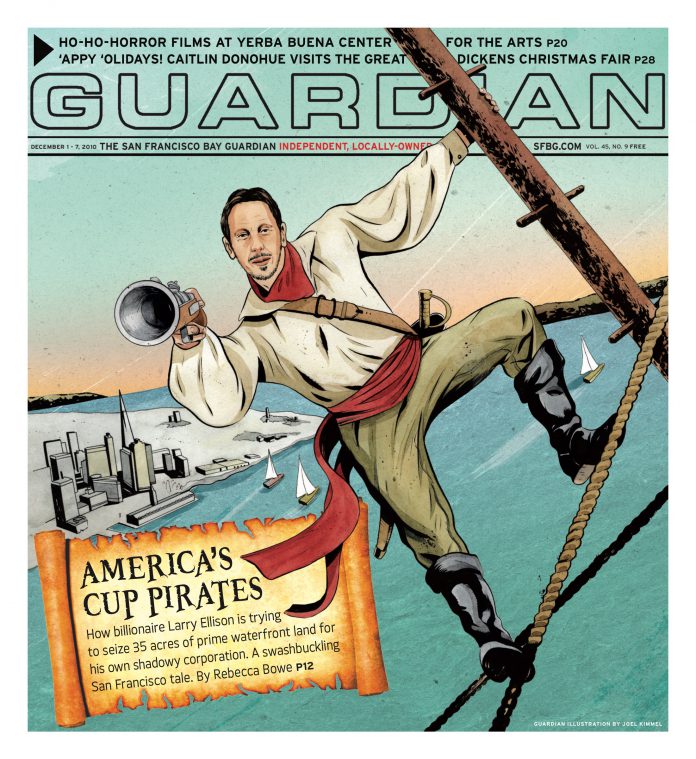arts@sfbg.com
FILM “Lose yourself,” ballet company head Thomas (Vincent Cassel) whispers to his leading lady, Nina (Natalie Portman), moments before she takes the stage. But Nina is already consumed with trying to find herself. Rarely has a journey of self-discovery been so unsettling.
Set in New York City’s catty, competitive ballet world, Black Swan samples from earlier dance films (notably 1948’s The Red Shoes, but also 1977’s Suspiria, with a smidgen of 1995’s Showgirls), though director Darren Aronofsky is nothing if not his own visionary. Black Swan resembles his 2008 The Wrestler somewhat thematically, with its focus on the anguish of an athlete under ten tons of pressure, but it’s a stylistic 180. Gone is the gritty, stripped-down aesthetic used to depict a sad-sack strongman. Like Dario Argento’s 1977 horror fantasy, the elegantly choreographed Black Swan is set in a hyper-constructed world, with stabbingly obvious color palettes (literally, white = good; black = evil) and dozens of mirrors emphasizing (over and over again) the film’s doppelgänger obsession.
Of course, none of this is out of line: the ballet at the center of Black Swan is, obviously, Swan Lake, in which a single dancer portrays both the White (good) and Black (evil) Swans. And in dance, mirrors are necessarily everywhere. Nina constantly stares at herself, and not just while practicing her steps. “I just want to be perfect,” she blurts out to Thomas, nervously lobbying for the Swan Queen role — made suddenly available due to the reluctant retirement of the company’s prima ballerina (Winona Ryder, feral and fierce in her few scenes).
See, Nina’s been with the company for four years, and though her talent is apparent, she’s made no waves (or friends, it would seem). All she cares about is dance, and she’s tunnel vision-enabled by her mother (a spooky Barbara Hershey), who babies Nina even as she blames her for monkeywrenching her own ballet career. Portman is 29 years old, and though she’s presumably playing younger here, Black Swan doesn’t pretend she’s a teenager. Thomas’ “visceral and real” (ahem) take on Swan Lake is Nina’s last chance to be a star before she’s too old to be in the running.
If you’ve seen Black Swan‘s poster or provocative trailer, you know that Nina gets the part — and it’s no spoiler to say that her already-fragile mental state gets just as much a workout as her muscles. Although: rarely has any film about ballet (an exquisite, graceful art form) so emphasized its day-to-day tortures, or exaggerated them, as Nina’s deterioration takes some unexpectedly gory detours.
Exacerbating Nina’s frustration is Lily (Mila Kunis), a brand-new addition to the company who resembles Nina in passing, but is otherwise everything the rigid, frigid Nina is not: a sexy, rebellious free spirit whose mere presence jams Nina’s brainwaves. (Not rocket science: Lily symbolizes the Black Swan; Nina, the White.) Naturally, they become frenemies. Lily is “imprecise and effortless,” according to Thomas; meanwhile, his loosen-up advice to the prim Nina is “go home and touch yourself.” The emphasis on masturbation is probably Black Swan‘s corniest conceit, though it does fold into the theme of Nina’s long-overdue awakening of her true self, sexual and otherwise.
As Nina, Portman gives her most dynamic performance to date. In addition to the thespian fireworks required while playing a goin’-batshit character, she also nails the role’s considerable athletic demands. (No need to play spot-the-dance-double, a game most thrillingly deployed during 1983’s Flashdance.) Portman’s intelligence and intense beauty can make it hard for her to seem like a real person onscreen, but as Black Swan‘s dread-filled bird, it all fits. It’s a career-elevating turn (and I suppose she’s finally off the hook for participating in those Star Wars prequels). Nina strives for perfection; Portman owns it.
BLACK SWAN opens Fri/3 in Bay Area theaters.

